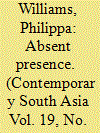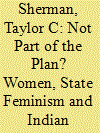|
|
|
Sort Order |
|
|
|
Items / Page
|
|
|
|
|
|
|
| Srl | Item |
| 1 |
ID:
107221


|
|
|
|
|
| Publication |
2011.
|
| Summary/Abstract |
This paper examines the everyday experiences and perspectives of Muslim Ansa-ris (weavers) in urban north India with respect to the 'welfare state'. The case of a recent health insurance scheme, initiated by the Indian government, constitutes the paper's focus. Narratives around the scheme expressed by residents in a majority Muslim mohalla- (neighbourhood) in Varanasi illustrate the ways in which the state's presence was more often experienced through its perceived absence and inaccessibility. But even whilst such experiences represented broader patterns of neglect, locally interpreted as the upshot of being India's largest religious minority, this community was not stricken by a sense of absolute alienation and nor did individual or collective actions exhibit outright disaffection towards the state. More appropriately, 'defensive agencies' informed by degrees of pragmatism, acceptance and resilience, were articulated in an effort to protect, as well as improve the future capacities and ambitions of the neighbourhood residents where the state had seemingly failed. The paper concludes however with a word of caution about celebrating such agency, and reflects on the potential for transformative politics by Muslims in urban India.
|
|
|
|
|
|
|
|
|
|
|
|
|
|
|
|
| 2 |
ID:
192300


|
|
|
|
|
| Summary/Abstract |
Building on anthropological developments in the study of the state that highlight its margins, informal connections, and everyday dynamics, this paper examines the diverse strategies that Tanchangya villagers employ while negotiating peace and ‘development’ processes with local state actors in the Chittagong Hill Tracts (CHT), Bangladesh. It shows that the state is manifested in various forms at the local level. In a myriad of forms of encounters with state actors, Tanchangya villagers employ situated strategies of avoidance, engagement, and resistance. The paper claims that these strategies ultimately contribute to challenge the dominant processes that confine Tanchangya villagers to a state of marginalisation, and aim to aid in the struggle to create greater spaces for the social, economic, and political dimensions of their lives. Thus, this paper offers an analysis of micro-power struggles that take place in the CHT’s rural spaces vis-à-vis the complex matrix of peace, citizenship, and ‘development’ in the region.
|
|
|
|
|
|
|
|
|
|
|
|
|
|
|
|
| 3 |
ID:
178866


|
|
|
|
|
| Summary/Abstract |
The 1950s are often derided in the scholarship as a period of welfarist policies which reinforced women’s role in the family and entrenched women’s economic dependence. This paper examines the Central Social Welfare Board, and in particular its Welfare Extension Projects, to provide a new characterisation of the approach to women’s issues during the period. It argues that the Central Social Welfare Board, with its unique administrative structure, its preference for voluntary activity, and its adherence to persuasion as a mode of action reflected many of the characteristics of Indian socialism of the time. It also sketches, from this angle, a partial picture of state feminism in India. In the Central Social Welfare Board, state feminism was concerned with the gradual transformation of women and a radical, if short-lived, makeover of the state.
|
|
|
|
|
|
|
|
|
|
|
|
|
|
|
|
| 4 |
ID:
103171


|
|
|
|
|
| Publication |
2011.
|
| Summary/Abstract |
This article draws from detailed fieldwork on the recent conservation-induced displacement of a Maharashtrian village in central India to contest the simplicity of conventional treatments of such displacement as a straightforward enactment of state power. Reflecting certain broader theories of power, agency and the state, the case of Botezari village presents a more nuanced reality in which state-society relations were transformed and retransformed. In the village's pre-relocation phase, a set of conducive factors came together to create a small opening which enabled a fundamental reworking of familiar state-oustee power relationships. This opening was ultimately short-lived, with spaces of oustee opportunity to direct change largely closed off in the post-relocation context. However, the villagers' memories of their pre-relocation liberating moment, and the strategic capacity, confidence and expectations honed in that moment, persisted to an extent that challenges the permanency and inevitability of displacement-induced marginalization in the conservation setting.
|
|
|
|
|
|
|
|
|
|
|
|
|
|
|
|
|
|
|
|
|